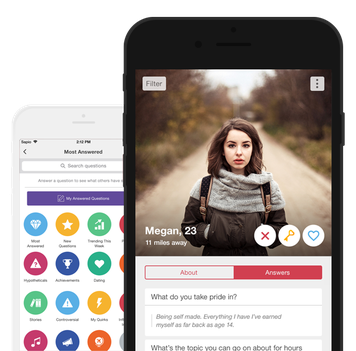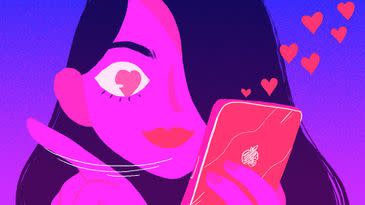What people really mean when they identify as sapiosexual on dating apps

The fog of love that is dating in 2019 has led to a near-constant barrage of new terms that help us navigate the uncertainties of modern courtship: ghosting, lumbersexual, cuffing, cloaking. To the novice, online dating profiles today can look like bafflingly coded messages with random-ass numbers (aka the unspoken requirement for men to include their height) and nonsense acronyms (aka Myers-Briggs personality type indicator).
But no online dating term has garnered quite as much instant popularity and vitriolic backlash as the sapiosexual.
Sapiosexuals claim to be more attracted to people's intelligence than their appearance, or consider high intelligence a big turn-on. No one wants to date an idiot, of course, but as Indiana University School of Public Health professor and sex researcher Debby Herbenick clarified, for sapiosexuals intellect is the most pivotal factor in attraction.
Nobody :
No one :
Not a single soul :
Men with "sapiosexual" in their OkCupid profile : https://t.co/w9TS2gdLN6— tiredttt (@BlvckGrlpwr) July 28, 2019
"Some people who identify as sapiosexual describe intelligence as a fetish or kink, others say they fall in love with someone’s brain," Herbenick said.
Identifying as a sapiosexual on your dating profile is considered a faux pas on par with using words like "wanderlust" or dudes using pictures of themselves holding a fish. Yet there's no denying that sapiosexuality caught onto the mainstream for a reason, filling a gap between the language we have available and the language we need to find connection in the online dating world.
SEE ALSO: People are using voice notes to pre-screen their date's personality
"On the internet, all you have is words. So while IRL you can watch how someone interacts with others or dances, online you just have what you type at each other," said psychologist, author, and sex coach Liz Powell.
Despite the backlash, the continued popularity of sapiosexuality on dating apps shows just how much online dating changes the way we express our relationship needs and desires. The problem, though, is that calling yourself a sapiosexual can mean a whole lot of different things — and not all of them are great.
The rise and fall of the sapiosexual
The rise of sapiosexuality is inextricably linked to the struggle to communicate who you really are to the rest of the internet.
First coined in a 1998 LiveJournal post by a user known as wolfieboy, it was born out of his frustration with the lack of words that fit his sexual preferences. The term only took off in the early 2010s through online quizzes, then solidifying into the dating lexicon in 2014 after OKCupid made it an option for sexual orientation and gender identity.

Image: sapio
A whole new app called Sapio even launched in 2017, advertised as the only dating app to match you based on intelligence (though it's still a very photo-forward design like Tinder). Over the past year alone, OkCupid also saw a 42 percent increase in people using the term on their profiles, according to a statement provided to Mashable by its global communications manager, Michael Kaye.
Sexuality researchers also took an interest in the sapiosexual phenomenon. One 2018 study tried to find a metric to determine whether it's a real orientation or fetish, while another one in 2019 examined the overall role intelligence plays in mate selection. But there isn't enough evidence yet to either support or debunk its legitimacy.
But critics have already written off so-called sapiosexuals as pretentious at best and discriminatory at worst, while also demeaning real marginalized gender and sexual orientations in the LGBTQ community. "When even Tumblr doesn’t recognize your sexual orientation, you’ve got a problem," one Daily Beast article concluded.
"Sapiosexuality is a highly controversial term these days because of the ways it can enshrine classist, ableist, sexist, and racist ideas about what it means to be 'smart,'" said Powell. "Most folks who identify as sapiosexual mean that they like being able to have good conversations with the people they date."
Even the Sapio app betrays the utter vagueness of the term, marketing itself as "the only app that gets to the core of people through their lived experiences, heartfelt opinions, and bold passions." Which sounds like, you know, any fulfilling relationship.
But Sapio's CEO Kristin Tynski also revealed what's really at the heart of the sapiosexual trend, when she told the the Huffington Post: “For many, defining oneself as sapiosexual has become [a] statement against the current status quo of hookup culture and superficiality, where looks are prized above all else."
Similarly, Coffee Meets Bagel CEO Dawoon Kang told Mashable that the rise of sapiosexuality "is part of an underlying trend with swipe fatigue in online dating culture." In other words, people are tired of sifting through hundreds of profiles, judging people's desirability based on a few pictures: "It's left them feeling empty."
So sure, it's probably the wrong word. But the sentiments behind sapiosexuality get at a very real and very common need that's come out of the age of online dating: wanting deeper, long-term connections.
So what does being sapiosexual really mean?
What sapiosexuality really seems to emphasize is people's desire for an equal partner with shared interests, opinions, self-actualization, drive, and education levels.
Wow! This Man is Sapiosexual But Also Likes Big Boobs: https://t.co/DddshEgGlo pic.twitter.com/C5QSRMhzvd
— Reductress (@Reductress) February 14, 2018
Western Sydney University professor and sex researcher Peter Jonason doubts sapiosexuality is a legitimate orientation because it fails to account for the many other, more fundamental factors behind a sapiosexual's mating selection.
In the 2018 study people who classified as sapiosexual admitted to still caring about a baseline of physical attractiveness in their partner. And unlike an orientation like homosexuality, attraction to high intelligence comes secondary to factors like gender, biological sex, and even similar values.
"People can be intelligent in ways you don't value or [that] don't satisfy your specific needs," Jonason said, giving the example of a sapiosexual Democrat who would, in 2019, probably never find themselves attracted to a Republican no matter how "intelligent" they were.
SEE ALSO: Emma Thompson says Donald Trump once asked her out but she turned him down
Our definitions of intelligence are relative to our own intelligence, with research suggesting that even those who highly value intelligence in a partner still have a cap for exactly how much smarter they want that person to be.
"In general, folks tend to think that those who share their existing views are smarter than those who don't, so it's about shared social location and experience, not intelligence," said Powell.
Sure enough, the self-identified sapiosexuals Mashable talked to and who've been interviewed elsewhere have vastly different definitions of "intelligence," ranging from emotional maturity, humor, drive, and IQ, to curiosity, the use of proper grammar, and liking the same "smart" things they like.
They also often express an aversion to what they perceive as dumb people and their baser interests.
"For me, I'd say it's much more about awareness, and being emotionally intelligent. I like someone who takes their time seriously to better themselves intellectually by learning more about people and the world versus staying stuck in their own little bubble. I think it's a thirst for information which turns me on," said Jen Kaarlo, a 35-year-old UX copywriter.
Even then, though, she doesn't include sapiosexual on her dating profile precisely because of the stigma around it.
"I find dumb people exhausting and somehow I wonder how they have survived," said Roxxanne Miller, a 28-year-old Romanian cam model who's made sapiosexuality part of her brand. "I appreciate a person who strives to push the limits."
From Kang's perspective, sapiosexuals are zeroing in on one of the most important factors in predicting longterm compatibility: value alignment. For that reason, she doesn't believe in shaming people for being upfront about what they prioritize in a partner, whether it's wealth, education, or intelligence.
Interestingly, Jonason's research also found that intelligence becomes increasingly important in mate selection when people (particularly men) are looking for long-term relationships rather than just casual sex. So identifying as a sapiosexual on a dating app could be a coded, less direct way of saying you're not interested in one-night stands.
The thing is, though, putting 'sapiosexual' in a dating profile is often more about distinguishing your own identity than describing any particular preference in partners.
"Sapiosexuality can be a way of virtue signaling, like saying, 'Hey, I value your brain more than your looks," said Jonason. In the current cultural climate, it's woke to deny baser animalistic instincts like physical attractiveness as influencing your dating habits.
"Or it can also be a way of showing off how much more intellectually advanced you are," said Jonason. "'Sapiosexual' implies that your mating preference are superior to other people's."

Image: vicky leta / mashable art team
Again, none of that applies to all self-identified sapiosexuals. But that goes back to the original issue: there's no universally agreed-upon meaning for the term. Using it on your profile explicitly and implicitly communicates a vast array of desires and preferences, some of them admirable and some of them less so.
But according to Herbenick, what the majority of people probably mean when they call themselves sapiosexual is "they want to talk, they want to connect, they want intimacy, they care about intelligence, and want to learn about another human being."
If that's the case, though, sapiosexual isn't the word that's gonna get you there.
What's smarter than a sapiosexual?
So sapiosexuality most likely isn't an orientation, since it's about way more than just sex. It also isn't a very useful identity, since it's no more specific than Human Who Likes Engaging Conversation.
"It's a really rough shorthand for, 'I want someone who is like me, values the things I value, and thinks the way I think,'" said Jonason. "In other words, it's about compatibility. But how you define compatibility is person-specific. It's a question of 'Are you compatible with me?'"
If anything, sapiosexuality describes a preference for certain personality traits that are better defined by models like the big five, often used by researchers to evaluate people's dispositions. Based on how most people describe it, sapiosexuality sounds like a desire for partners with high "openness to experience."
Or perhaps you're one of those people using sapiosexuality to imply a desire for a longterm relationships, or only feeling sexually attracted to those you share a strong emotional connection with. Well for that, you might want to look into demisexuality, which is a much more well-defined sexual orientation.
Ultimately, though, Jonason said, "There's no single word for it because we're trying to use one word to describe a quite varied phenomenon."
Like lumbersexual, sapiosexual can be harmless when used to cheekily describe being horny for a subcultural trend. Nerds are hot now, so it only makes sense that we'd make up a term for thirsting after that type.
But, also like the lumbersexual phenomenon, it will inevitably draw some annoyed hipster backlash.
"People don't feel at liberty to say what they want in modern dating culture for fear of being judged by a bunch of strangers. There's a lot of not wanting to send the wrong signals. So having these terms does make it easier and a little more acceptable to express what you want," said Kang, the Coffee Meets Bagel CEO.
Sapiosexuality might not be "real", but it has clear utility for a whole range of people. It might be a fad, but it highlights a huge issue in online dating culture: It's become so vapid that we're confusing the normal-ass desire for a serious, long-lasting connection with someone for a new sexual orientation.
For those of us (because make no mistake, I am one of you) with a particular weakness for nerds or tendency to sexualize knowledge to kinky degrees, there's a better, more precise word out there.
Maybe something like Thought Thots, or Mindfuckers, or even BBE (Big Brain Energy). You're smart. You'll figure it out.
WATCH: 'I was cloaked.' What it's like to be blocked and stood up by your Hinge date.


